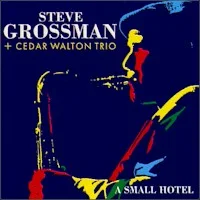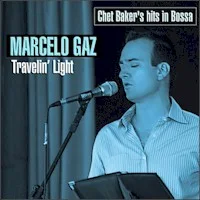Styles: Vibraphone Jazz
Year: 1972
File: MP3@320K/s
Time: 34:28
Size: 79,0 MB
Art: Front
(10:10) 1. For Someone I Love (What's Your Story)
( 7:00) 2. What Are You Doing the Rest of Your Life?
( 8:23) 3. People Make the World Go Round
( 8:52) 4. Sunflower
Sunflower
Year: 1972
File: MP3@320K/s
Time: 34:28
Size: 79,0 MB
Art: Front
(10:10) 1. For Someone I Love (What's Your Story)
( 7:00) 2. What Are You Doing the Rest of Your Life?
( 8:23) 3. People Make the World Go Round
( 8:52) 4. Sunflower
With a series of mainstream dates to his credit dating back to the early 1950s not to mention charter membership in the now-legendary Modern Jazz Quartet (MJQ) and one-offs with everyone from bop saxophonist Charlie Parker to "new thing" saxophonist John Coltrane vibraphonist Milt Jackson was the clear link between his instrument's swing era beginnings with Lionel Hampton and more progressive things to come with then-relative youngsters Gary Burton and Bobby Hutcherson. Still and despite the label's centrist-leaning proclivities on one hand, balancing out its more groove-centric tendencies on the other Jackson's signing with CTI Records was something of a surprise, as was his first project, Cherry (1972), an uneven collaboration with label-hit Stanley Turrentine. His first release for the label as a full-out leader, 1972's Sunflower fares much better, even with the presence of Don Sebesky, an arranger who brought out some of the worst of CTI's easy listening tendencies, but, equally, delivered some tremendously inventive and tasteful orchestral work. Here, with a harpist and 11-piece string ensemble, Sebesky gives Jackson's opening ballad, "For Someone in Love," a burnished sheen, but it can't take away from the vibraphonist's ethereal touch, flugelhornist Freddie Hubbard's more propulsive approach, or pianist Hancock's abstract impressionism; all making for a stunning intro to an album that posits Jackson in even broader contexts than his discography to date. The Legrand/Berman ballad, "What Are You Doing the Rest of Your Life?," the Grammy-nominated song from Richard Brooks' 1969 film, The Happy Ending, swings with the kind of graceful elegance that Jackson had honed in the MJQ, but Hancock's more exploratory accompaniment drives the tune into unexpected places, even as Ron Carter's low, resonant bass notes support the tune with perfect simplicity. What was, back in the day, side one of Sunflower was, then, a bit of a shift for Jackson into more accessible territory, but nothing earth-shattering. Tectonic plates didn't move for those who put on side two of the disc, either, but opening with The Stylistics' oft-covered hit, "People Make the World Go Round,"was something new, as the vibraphonist entered light funk territory. Carter, locked-in with drummer Billy Cobham, proves that, at a time when electric bassists like Stanley Clarke and Alphonso Johnson were on the cusp of becoming fusion stars with {Return to Forever}} and Weather Report, the acoustic bass was still the absolute funkiest low-end instrument of all. Hubbard's closing title track is also a foray into light Latin music, with a soft string cushion broadening the soundscape when the tune moves into double-time during Hubbard's plangent solo. The closing bonus track (not new, it's been on CD issues since 1997), Jackson's "SKJ," feels like something of an anomaly, both in its hard-swinging pulse and production rawer, and less refined than the rest of the set. It speaks to the truth that musicians may move around stylistically during their long careers, but they don't forget where they came from. A beautiful record that expands an already broad view of Jackson, this CTI Masterworks reissue brings one of the vibraphonist's best albums back into print. ~ John Kelman https://www.allaboutjazz.com/sunflower-milt-jackson-cti-masterworks-review-by-john-kelman.php
Personnel: Milt Jackson: vibraphone; Freddie Hubbard: flugelhorn; George Marge: clarinet,bass clarinet,alto flute, English horn; Phil Bodner: flute, alto flute, piccolo, English horn; Romeo Penque: alto flute, oboe, English horn; Herbie Hancock: piano, electric piano (5); Jay Berliner: guitar; Ron Carter: bass; Billy Cobham: drums; Ralph MacDonald: percussion; Max Ellen: violin; Paul Gershman: violin; Emanuel Green: violin; Charles Libove: violin; Joe Malin: violin; David Nadien: violin; Gene Orloff: violin; Elliot Rosoff: violin; Charles McCracken: cello;, George Ricci: cello; Alan Shulman: cello; Margaret Ross: harp; Don Sebesky: arranger, conductor.
Personnel: Milt Jackson: vibraphone; Freddie Hubbard: flugelhorn; George Marge: clarinet,bass clarinet,alto flute, English horn; Phil Bodner: flute, alto flute, piccolo, English horn; Romeo Penque: alto flute, oboe, English horn; Herbie Hancock: piano, electric piano (5); Jay Berliner: guitar; Ron Carter: bass; Billy Cobham: drums; Ralph MacDonald: percussion; Max Ellen: violin; Paul Gershman: violin; Emanuel Green: violin; Charles Libove: violin; Joe Malin: violin; David Nadien: violin; Gene Orloff: violin; Elliot Rosoff: violin; Charles McCracken: cello;, George Ricci: cello; Alan Shulman: cello; Margaret Ross: harp; Don Sebesky: arranger, conductor.
Sunflower




















